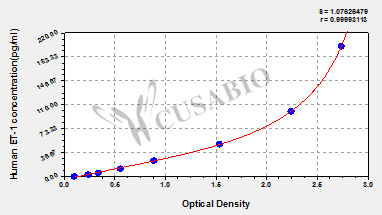Endothelin 1 (EDN1) is a potent vasoconstrictor peptide that plays a key role in cardiovascular physiology and pathology. This 21-amino acid peptide is primarily produced by vascular endothelial cells and acts through endothelin receptors to regulate vascular tone, blood pressure, and cardiac function. Elevated endothelin 1 levels are associated with various cardiovascular diseases, including hypertension, atherosclerosis, and heart failure. This makes it an important biomarker for cardiovascular research and clinical studies.
The Human Endothelin 1,ET-1 ELISA Kit (CSB-E07007h) provides quantitative measurement of endothelin 1 in human samples. This sandwich ELISA works with serum, cell culture supernates, urine, and saliva samples. Detection range spans 3.12 pg/mL to 200 pg/mL with sensitivity of 0.78 pg/mL. The assay requires 50-100 μL sample volume, operates at 450 nm detection wavelength, and can be completed within 1-5 hours.
Application Examples
Note: The following application examples are drawn from a selection of publications citing this product. For additional applications, please refer to the full list of references in the "Citations" section.
This ELISA kit has been used in clinical research studies to quantify endothelin-1 levels in human plasma samples. Applications span cardiovascular and metabolic research contexts, where endothelin-1 serves as an important biomarker for vascular function and disease states.
• Cardiovascular research: Measurement of plasma endothelin-1 levels alongside other vascular markers like nitric oxide and VEGF to evaluate endothelial function and vascular health
• Clinical biomarker studies: Quantification of endothelin-1 in hospitalized patients as part of comprehensive metabolic and cardiovascular profiling panels
• Oxidative stress research: Analysis of endothelin-1 levels in conjunction with lipid peroxidation markers and nitric oxide to evaluate vascular oxidative stress pathways
• Multi-analyte profiling: Integration of endothelin-1 measurements with inflammatory cytokines and other biomarkers in clinical research settings




